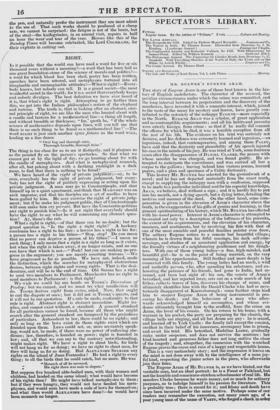. • , RIGHT.
• Is it possible that the world can have used a word for five or six thousand years WithOut a meaning?—a word that has been laid as one great fbundation-stone of the science of morals and polities?— a word for which blood has been shed, poetry has been written, speeches have been uttered, and metaphysics tortured into all imaginable and unimaginable attitudes?—What is-right P—Every- body knows, but nobody can tell. It is a grand secret—the most wonderful secret in the world; for it is a secret that everybody keeps and nobody divulges. The best definition we have ever heard of it is, that what's right is right. Attempting to go farther than this, we get into the Indian • philosopher's notion of the elephant and tortoise. The truth is, that in looking after an abstract, eter- nal principle of right, we are like the man who hunted about with a candle and lantern for a mathematical line—a thing all length, and without breadth Or thickness; "for," quoth he, "if' the whole science of mathematics depends upon lines, will you tell me that there is no such thing to be found as a mathematical line ?"—The word aiolir. is just such another ?gnis fatuus as the word WILL, leading us a fine dance "Over bog and thorough mire,
Thorough bramble, thorough briar."
The thing is too close for us to see it distinctly, and it plagues us as the painted fly on the parson's spectacles. So that what we cannot. get at by the light of day, we go hunting about for with the candle of metaphysics. And what is metaphysical research, after all, but poking about with a farthing rushlight in a dark room, to find that there is nothing to be found?
We have heard of the right of private judgment ;—ay, to be Sure, everybody has the right of private judgment, but every- body has net the right of publicly expressing or acting upon his private judgment. A man may go to Constantinople, and shut himself up in a quiet apartment, and think that MAHOMET was an arch impostor, and that his disciples are a set of noodles to have been gulled by him. He may exercise the right of private judg- ment; but if he make his judgment public, they of Constantinople will soon make him cry peccavi. But have the Constantinopolitans any right to punish him?—Is it not right that everybody should have the right to say what he will concerning any abstract ques- tion? Ay, there's the rub. What's right is.right,—of that there can be no doubt; but the grand question is, "Is the -right a right right?" A hackney Coachman has a right to his fare' a lawyer has a right to his fee; a parson has a right to his tithes—" Stop, stop! Do you mean that no power can deprive a parson of his tithes?"—I mean no such thing; I only mean that a right is a right as long as it exists, but when the right is taken away, it no longer exists, and no one can have that which is not.—" Pooh! but you are making no pro- gress in the argument; you are merely asserting truisms."—We have progressed as far as possible. We have not, indeed, made the distinction, which the searcher. for metaphysical 'abstractions desires, between right rights and wrong rights. That is the desi- deratum, and will be to the end of time. Old Sarum has a right to send two members to Parliament, Manchester has no right to send members to Parliament is that right? . We wish we could lay our hands on TOOKE's Diversions of' Parley; but we cannot, and we must try what recollection will do. TOOKE derives right from rectus,'ruled. Now, that ought to end the dispute at once; but it did not in TooKE's quarto, and it will not by our quotation. If a rule be made, conformity to that rule is right. Abstract right is abstract moonshine. Right im- plies, and cannot exist without, a standard. A general standard for all particulars cannot be found, because all those who might search after the general standard are hampered by the prejudices of particulars. Antecedent to law, there could be no rights; and only as long as the laws exist do those rights exist which are founded upon them. Laws could not, or, more accurately speak- ing, would not, be made, if there were no power of enforcing obe- dience; law, therefore, is founded on power; right is founded in law; and, all that we can say to the contrary notwithstanding, might makes right. We have a right to shoot birds, for birds will not hang us for so doing; we have no right to shoot men, for they will hang us for so doing. Had ALEXANDER SELKIRK any rights on the island of Juan Fernandez? He had a right to every thing; to all the birds that he could catch, but no more. He was
"Monarch of all he surveyed, — • His right there was none to dispute."
But suppose five hundred able-bodied men, with their women and children, had landed on the same island; what would have become of his rights then? He might have talked metaphysics to them; but if they were hungry, they would not have heeded his meta- physics, and would soon have made a code of laws for themselves; and what then would ALEXANDER have done?—he would have been monarch no longer.






























 Previous page
Previous page